
Holocaust in Russia
Encyclopedia
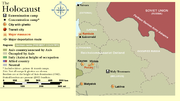
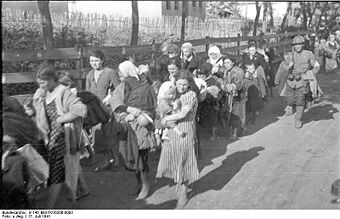
Nazi crime
Nazi crime or Hitlerite crime is a legal concept used in some legal systems .In the Polish legal system a Nazi crime is an action carried out by, inspired by or tolerated by public functionaries of the Third Reich that also classifies as a crime against humanity or other persecutions of people...
s during the occupation of Russia
Russian Soviet Federative Socialist Republic
The Russian Soviet Federative Socialist Republic , commonly referred to as Soviet Russia, Bolshevik Russia, or simply Russia, was the largest, most populous and economically developed republic in the former Soviet Union....
by Nazi Germany
Nazi Germany
Nazi Germany , also known as the Third Reich , but officially called German Reich from 1933 to 1943 and Greater German Reich from 26 June 1943 onward, is the name commonly used to refer to the state of Germany from 1933 to 1945, when it was a totalitarian dictatorship ruled by...
.
On the eve of the Holocaust
Beyond longstanding controversies, ranging from the Molotov-Ribbentrop PactMolotov-Ribbentrop Pact
The Molotov–Ribbentrop Pact, named after the Soviet foreign minister Vyacheslav Molotov and the German foreign minister Joachim von Ribbentrop, was an agreement officially titled the Treaty of Non-Aggression between Germany and the Soviet Union and signed in Moscow in the late hours of 23 August 1939...
to anti-Zionism
Anti-Zionism
Anti-Zionism is opposition to Zionistic views or opposition to the state of Israel. The term is used to describe various religious, moral and political points of view in opposition to these, but their diversity of motivation and expression is sufficiently different that "anti-Zionism" cannot be...
, the Soviet Union
Soviet Union
The Soviet Union , officially the Union of Soviet Socialist Republics , was a constitutionally socialist state that existed in Eurasia between 1922 and 1991....
did grant official "equality of all citizens regardless of status
Social status
In sociology or anthropology, social status is the honor or prestige attached to one's position in society . It may also refer to a rank or position that one holds in a group, for example son or daughter, playmate, pupil, etc....
, sex, race, religion, and nationality." The years before the Holocaust
The Holocaust
The Holocaust , also known as the Shoah , was the genocide of approximately six million European Jews and millions of others during World War II, a programme of systematic state-sponsored murder by Nazi...
were an era of rapid change for Soviet Jews, leaving behind the dreadful poverty of the Pale of Settlement
Pale of Settlement
The Pale of Settlement was the term given to a region of Imperial Russia, in which permanent residency by Jews was allowed, and beyond which Jewish permanent residency was generally prohibited...
. 40 % of the population in the former Pale left for large cities within the USSR. Emphasis on education and movement from countryside shtetl
Shtetl
A shtetl was typically a small town with a large Jewish population in Central and Eastern Europe until The Holocaust. Shtetls were mainly found in the areas which constituted the 19th century Pale of Settlement in the Russian Empire, the Congress Kingdom of Poland, Galicia and Romania...
s to newly industrialized cities allowed many Soviet Jews to enjoy overall advances under Stalin and to become one of the most educated population groups in the world. Due to Stalinist emphasis on its urban population, interwar migration inadvertently rescued countless Soviet Jews; Nazi Germany
Nazi Germany
Nazi Germany , also known as the Third Reich , but officially called German Reich from 1933 to 1943 and Greater German Reich from 26 June 1943 onward, is the name commonly used to refer to the state of Germany from 1933 to 1945, when it was a totalitarian dictatorship ruled by...
penetrated the entire former Jewish Pale — but were kilometers short of Leningrad
Saint Petersburg
Saint Petersburg is a city and a federal subject of Russia located on the Neva River at the head of the Gulf of Finland on the Baltic Sea...
and Moscow
Moscow
Moscow is the capital, the most populous city, and the most populous federal subject of Russia. The city is a major political, economic, cultural, scientific, religious, financial, educational, and transportation centre of Russia and the continent...
. The great wave of deportations from the areas annexed by Soviet Union according to the Nazi-Soviet pact, often seen by victims as genocide, paradoxically also saved lives of a few hundred thousand Jewish deportees. However horrible their conditions, the fate of Jews in Nazi Germany was much worse. The migration of many Jews deeper East from the part of the Jewish Pale that would become occupied by Germany saved at least forty percent of this area's Jewish population.
World War II
On 22 June 1941, Adolf HitlerAdolf Hitler
Adolf Hitler was an Austrian-born German politician and the leader of the National Socialist German Workers Party , commonly referred to as the Nazi Party). He was Chancellor of Germany from 1933 to 1945, and head of state from 1934 to 1945...
abruptly broke the non−aggression pact and invaded the Soviet Union
Operation Barbarossa
Operation Barbarossa was the code name for Germany's invasion of the Soviet Union during World War II that began on 22 June 1941. Over 4.5 million troops of the Axis powers invaded the USSR along a front., the largest invasion in the history of warfare...
. The Soviet territories occupied by early 1942, including all of Belarus, Estonia, Latvia, Lithuania, Ukraine, and Moldova
Moldova
Moldova , officially the Republic of Moldova is a landlocked state in Eastern Europe, located between Romania to the West and Ukraine to the North, East and South. It declared itself an independent state with the same boundaries as the preceding Moldavian Soviet Socialist Republic in 1991, as part...
and most Russian territory west of the line Leningrad
Leningrad
Leningrad is the former name of Saint Petersburg, Russia.Leningrad may also refer to:- Places :* Leningrad Oblast, a federal subject of Russia, around Saint Petersburg* Leningrad, Tajikistan, capital of Muminobod district in Khatlon Province...
-Moscow-Rostov
Rostov
Rostov is a town in Yaroslavl Oblast, Russia, one of the oldest in the country and a tourist center of the Golden Ring. It is located on the shores of Lake Nero, northeast of Moscow. Population:...
, contained about four million Jews, including hundreds of thousands who had fled Poland in 1939. Despite the chaos of the Soviet retreat, some effort was made to evacuate Jews, who were either employed in the military industries of were family members of servicemen. Of 4 million about a million succeeded in escaping further east. The remaining three million were left at the mercy of the Nazis. Despite the subservience of the Oberkommando des Heeres
Oberkommando des Heeres
The Oberkommando des Heeres was Nazi Germany's High Command of the Army from 1936 to 1945. The Oberkommando der Wehrmacht commanded OKH only in theory...
to Adolf Hitler, Heinrich Himmler
Heinrich Himmler
Heinrich Luitpold Himmler was Reichsführer of the SS, a military commander, and a leading member of the Nazi Party. As Chief of the German Police and the Minister of the Interior from 1943, Himmler oversaw all internal and external police and security forces, including the Gestapo...
did not trust the Army to approve of, let alone carry out, the large-scale killings of Jews in the occupied Soviet territories. This task was assigned to SS formations called Einsatzgruppen
Einsatzgruppen
Einsatzgruppen were SS paramilitary death squads that were responsible for mass killings, typically by shooting, of Jews in particular, but also significant numbers of other population groups and political categories...
("task groups"), under the overall command of Reinhard Heydrich
Reinhard Heydrich
Reinhard Tristan Eugen Heydrich , also known as The Hangman, was a high-ranking German Nazi official.He was SS-Obergruppenführer and General der Polizei, chief of the Reich Main Security Office and Stellvertretender Reichsprotektor of Bohemia and Moravia...
. These had been used on a limited scale in Poland in 1939, but were now organized on a much larger scale. According to Otto Ohlendorf
Otto Ohlendorf
Otto Ohlendorf was a German SS-Gruppenführer and head of the Inland-SD , a section of the SD. Ohlendorf was the commanding officer of Einsatzgruppe D, which conducted mass murder in Moldova, south Ukraine, the Crimea, and, during 1942, the north Caucasus...
at his trial
Einsatzgruppen Trial
The Einsatzgruppen Trial was the ninth of the twelve trials for war crimes the U.S. authorities held in their occupation zone in Germany in Nuremberg after the end of World War II. These twelve trials were all held before U.S...
, "the Einsatzgruppen had the mission to protect the rear of the troops by killing the Jews, gypsies, Communist functionaries, active Communists, and all persons who would endanger the security." In practice, their victims were nearly all defenseless Jewish civilians (not a single Einsatzgruppe member was killed in action during these operations). Raul Hilberg
Raul Hilberg
Raul Hilberg was an Austrian-born American political scientist and historian. He was widely considered to be the world's preeminent scholar of the Holocaust, and his three-volume, 1,273-page magnum opus, The Destruction of the European Jews, is regarded as a seminal study of the Nazi Final...
writes that the Einsatzgruppe member were ordinary citizens; the great majority were university-educated professionals. They used their skills to become efficient killers, according to Michael Berenbaum
Michael Berenbaum
Michael Berenbaum is an American scholar, professor, rabbi, writer, and film-maker, who specializes in the study of the memorialization of the Holocaust...
. By the end of 1941, however, the Einsatzgruppen had killed only 15 percent of the Jews in the occupied Soviet territories, and it was apparent that these methods could not be used to kill all the Jews of Europe. Even before the invasion of the Soviet Union, experiments with killing Jews in the back of vans using gas from the van's exhaust had been carried out, and when this proved too slow, more lethal gasses were tried. For large-scale killing by gas, however, fixed sites would be needed, and it was decided—probably by Heydrich and Eichmann—that the Jews should be brought to camps specifically built for the purpose.
Although the Soviet Union was victorious in World War II
World War II
World War II, or the Second World War , was a global conflict lasting from 1939 to 1945, involving most of the world's nations—including all of the great powers—eventually forming two opposing military alliances: the Allies and the Axis...
, the war resulted in around 26–27 million Soviet deaths (estimates vary) and had devastated the Soviet economy in the struggle. Some 1,710 towns and 70 thousand settlements were destroyed. The occupied territories suffered from the ravages of German occupation and deportations of slave labor in Germany. Thirteen million Soviet citizens became victims of a repressive policy of Germans and their allies on an occupied territory, where died because of mass murders, famine
Famine
A famine is a widespread scarcity of food, caused by several factors including crop failure, overpopulation, or government policies. This phenomenon is usually accompanied or followed by regional malnutrition, starvation, epidemic, and increased mortality. Every continent in the world has...
, absence of elementary medical aid and slave labor. The Nazi Genocide of the Jews carried by German Einsatzgruppen
Einsatzgruppen
Einsatzgruppen were SS paramilitary death squads that were responsible for mass killings, typically by shooting, of Jews in particular, but also significant numbers of other population groups and political categories...
, along the local collaborators resulted in almost complete annihilation of the Jewish population over the entire territory temporary occupied by Germany and its allies. During occupation, Russia's Leningrad
Leningrad
Leningrad is the former name of Saint Petersburg, Russia.Leningrad may also refer to:- Places :* Leningrad Oblast, a federal subject of Russia, around Saint Petersburg* Leningrad, Tajikistan, capital of Muminobod district in Khatlon Province...
, now Saint Petersburg
Saint Petersburg
Saint Petersburg is a city and a federal subject of Russia located on the Neva River at the head of the Gulf of Finland on the Baltic Sea...
, region lost around a quarter of its population. 3.6 million Soviet prisoners of war (of 5.5 million) died in German camps. British
British people
The British are citizens of the United Kingdom, of the Isle of Man, any of the Channel Islands, or of any of the British overseas territories, and their descendants...
historian Martin Gilbert
Martin Gilbert
Sir Martin John Gilbert, CBE, PC is a British historian and Fellow of Merton College, University of Oxford. He is the author of over eighty books, including works on the Holocaust and Jewish history...
used a similar approach in his Atlas of the Holocaust, but arrived at a number of 5.75 million Jewish victims, since he estimated higher numbers of Jews killed in Russia and other locations. Lucy S. Dawidowicz
Lucy Dawidowicz
Lucy Schildkret Dawidowicz was an American historian and an author of books on modern Jewish history, in particular books on the Holocaust.-Life:...
used pre-war census figures to estimate that 5.934 million Jews died (see her figures (left) here). In October 1943, 600 Jewish and Russian prisoners attempted an escape at the Sobibór extermination camp
Sobibór extermination camp
Sobibor was a Nazi German extermination camp located on the outskirts of the town of Sobibór, Lublin Voivodeship of occupied Poland as part of Operation Reinhard; the official German name was SS-Sonderkommando Sobibor...
. About 60 survived and joined the Belarusian partisans
Belarusian partisans
Belarusian partisans were fighters in irregular military groups participating in the Belarusian resistance movement, including against Nazi Germany and collaborationism during World War II.- World War II :...
. In Eastern Europe
Eastern Europe
Eastern Europe is the eastern part of Europe. The term has widely disparate geopolitical, geographical, cultural and socioeconomic readings, which makes it highly context-dependent and even volatile, and there are "almost as many definitions of Eastern Europe as there are scholars of the region"...
, many Jews joined the ranks of the Soviet partisans
Soviet partisans
The Soviet partisans were members of a resistance movement which fought a guerrilla war against the Axis occupation of the Soviet Union during World War II....
: throughout the war, they faced antisemitism and discrimination from the Soviets and some Jewish partisans were killed, but over time, many of the Jewish partisan groups were absorbed into the command structure of the much larger Soviet partisan movement. Soviet partisans were not in a position to ensure protection to the Jews in the Holocaust
The Holocaust
The Holocaust , also known as the Shoah , was the genocide of approximately six million European Jews and millions of others during World War II, a programme of systematic state-sponsored murder by Nazi...
. The fit Jews were usually welcomed by the partisans (sometimes only if they brought their own weapons); however women, children, and the elderly were mostly unwelcome. Eventually, however, separate Jewish groups, both guerrilla units and mixed family groups of refugee
Refugee
A refugee is a person who outside her country of origin or habitual residence because she has suffered persecution on account of race, religion, nationality, political opinion, or because she is a member of a persecuted 'social group'. Such a person may be referred to as an 'asylum seeker' until...
s (like the Bielski partisans
Bielski partisans
The Bielski partisans were an organisation of Jewish partisans who rescued Jews from extermination and fought against the Nazi German occupiers and their collaborators in the vicinity of Nowogródek and Lida in German-occupied Poland...
), were subordinated to the communist partisan leadership and considered as Soviet assets. Even as some assisted the Germans, a significant number of individuals in the territories under German control also helped Jews escape death (see Righteous Among the Nations
Righteous Among the Nations
Righteous among the Nations of the world's nations"), also translated as Righteous Gentiles is an honorific used by the State of Israel to describe non-Jews who risked their lives during the Holocaust to save Jews from extermination by the Nazis....
). During World War II
World War II
World War II, or the Second World War , was a global conflict lasting from 1939 to 1945, involving most of the world's nations—including all of the great powers—eventually forming two opposing military alliances: the Allies and the Axis...
, Léon Poliakov
Leon Poliakov
Léon Poliakov was a French historian who wrote extensively on the Holocaust and anti-Semitism.Born into a Russian Jewish family, Poliakov lived in Italy and Germany until he settled in France....
established the Centre de documentation juive contemporaine
Faurisson affair
The Faurisson affair is a term given to an academic controversy in the wake of a book by Robert Faurisson, a Holocaust denier. The scandal largely dealt with the inclusion of an essay by Noam Chomsky, entitled Some Elementary Comments on the Rights of Freedom of Expression, as an introduction to...
(1943) and after the war, he assisted Edgar Faure
Edgar Faure
Edgar Faure was a French politician, essayist, historian, and memoirist.-Career:Faure was born in Béziers, Languedoc-Roussillon. He trained as a lawyer in Paris and became a member of the Bar at 27, the youngest lawyer in France to do so at the time...
at the Nuremberg Trial. By 1944, the Germans had been pushed out of the Soviet Union
Soviet Union
The Soviet Union , officially the Union of Soviet Socialist Republics , was a constitutionally socialist state that existed in Eurasia between 1922 and 1991....
onto the banks of the Vistula River, just east of Prussia. With Soviet Marshal Georgy Zhukov
Georgy Zhukov
Marshal of the Soviet Union Georgy Konstantinovich Zhukov , was a Russian career officer in the Red Army who, in the course of World War II, played a pivotal role in leading the Red Army through much of Eastern Europe to liberate the Soviet Union and other nations from the Axis Powers' occupation...
attacking from Prussia, and Marshal Konev slicing Germany in half from the south the fate of Nazi Germany
Nazi Germany
Nazi Germany , also known as the Third Reich , but officially called German Reich from 1933 to 1943 and Greater German Reich from 26 June 1943 onward, is the name commonly used to refer to the state of Germany from 1933 to 1945, when it was a totalitarian dictatorship ruled by...
was sealed. It is estimated that up to 1.4 million Jews fought in Allied
Allies of World War II
The Allies of World War II were the countries that opposed the Axis powers during the Second World War . Former Axis states contributing to the Allied victory are not considered Allied states...
armies; 40% of them in the Red Army
Red Army
The Workers' and Peasants' Red Army started out as the Soviet Union's revolutionary communist combat groups during the Russian Civil War of 1918-1922. It grew into the national army of the Soviet Union. By the 1930s the Red Army was among the largest armies in history.The "Red Army" name refers to...
. In total, at least 142 500 Soviet soldiers of Jewish nationality lost their lives fighting against the German invadors and their allies Salomon Smolianoff
Salomon Smolianoff
Salomon Smolianoff was a Russian counterfeiter and Holocaust survivor involved in Operation Bernhard. In the film The Counterfeiters based on Adolf Burger's memoirs received a foreign-language Oscar for Austria in 2008, the character is renamed Salomon "Salli" Sorowitsch...
was selected for Operation Bernhard, transferred to the Sachsenhausen concentration camp
Sachsenhausen concentration camp
Sachsenhausen or Sachsenhausen-Oranienburg was a Nazi concentration camp in Oranienburg, Germany, used primarily for political prisoners from 1936 to the end of the Third Reich in May, 1945. After World War II, when Oranienburg was in the Soviet Occupation Zone, the structure was used as an NKVD...
in 1944, and eventually to the Ebensee
Ebensee
Ebensee is a market town in the Traunviertel region of the Austrian state of Upper Austria, located within the Salzkammergut Mountains at the southern end of the Traunsee. The regional capital Linz lies approximately to the north, nearest towns are Gmunden and Bad Ischl...
site of the Mauthausen camp network, where he was liberated by the US Army on 6 May 1945. Without changing its official anti-Zionist stance, from late 1944 until 1948 Stalin had adopted a de facto pro-Zionist foreign policy, apparently believing that the new country would be socialist
Socialism
Socialism is an economic system characterized by social ownership of the means of production and cooperative management of the economy; or a political philosophy advocating such a system. "Social ownership" may refer to any one of, or a combination of, the following: cooperative enterprises,...
and would speed the decline of British
United Kingdom
The United Kingdom of Great Britain and Northern IrelandIn the United Kingdom and Dependencies, other languages have been officially recognised as legitimate autochthonous languages under the European Charter for Regional or Minority Languages...
influence in the Middle East
Middle East
The Middle East is a region that encompasses Western Asia and Northern Africa. It is often used as a synonym for Near East, in opposition to Far East...
.
After World War II
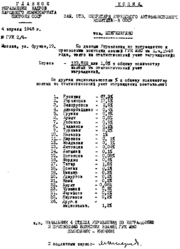
Solomon Mikhoels
Solomon Mikhoels ; was a Soviet Jewish actor and the artistic director of the Moscow State Jewish Theater. Mikhoels served as the chairman of the Jewish Anti-Fascist Committee during the Second World War...
, a popular actor-director of the Moscow State Jewish Theater
Moscow State Jewish Theater
The Moscow State Jewish Theater, Russian language: Московский Государственный Еврейский Театр, also known by its acronym GOSET: ГОСЕТ) was a Yiddish theater company established in 1919 and shut down in 1948 by the Soviet authorities....
and the chairman of the Jewish Anti-Fascist Committee
Jewish Anti-Fascist Committee
The Jewish Anti-Fascist Committee was formed on Joseph Stalin's order in Kuibyshev in April 1942 with the official support of the Soviet authorities...
, was killed in a suspicious car accident. Mass arrests of prominent Jewish intellectuals and suppression of Jewish culture followed under the banners of campaign against "rootless cosmopolitans" and anti-Zionism
Anti-Zionism
Anti-Zionism is opposition to Zionistic views or opposition to the state of Israel. The term is used to describe various religious, moral and political points of view in opposition to these, but their diversity of motivation and expression is sufficiently different that "anti-Zionism" cannot be...
. On 12 August 1952, in the event known as the Night of the Murdered Poets
Night of the Murdered Poets
On August 12, 1952, thirteen Soviet Jews were executed in the Lubyanka Prison in Moscow, Russia as a result of charges of espionage based on forced, false confessions resulting from coercion and torture. This massacre is known as the Night of the Murdered Poets....
, thirteen most prominent Yiddish writers, poets, actors and other intellectuals were executed on the orders of Joseph Stalin, among them Peretz Markish
Peretz Markish
Peretz Davidovich Markish was a Soviet/Russian Jewish poet and playwright who wrote in Yiddish.Peretz Markish was born in Polonnoye in 1895. His distant ancestors lived in Spain. As a child he attended a cheder and sang in the choir of the local synagogue. He served as a private in the Russian...
, Leib Kvitko
Leib Kvitko
Leib Kvitko was a prominent Yiddish poet, an author of well-known children's poems and a member of the Jewish Anti-Fascist Committee . He was one of the editors of Eynikayt and of the Heymland, a literary magazine...
, David Hofstein
David Hofstein
David Hofstein was a Yiddish poet.He was born in Ukraine, Russian Empire and received a traditional Jewish education; his application to the Kiev University was declined. Hofstein began to write in Yiddish, Hebrew, Russian, and Ukrainian....
, Itzik Feffer
Itzik Feffer
Itzik Feffer , also Fefer was a Soviet Yiddish poet who fell victim to Joseph Stalin's purges.-Background:...
and David Bergelson
David Bergelson
David Bergelson was a Yiddish language writer. Ukrainian-born, he lived for a time in Berlin, Germany. He moved back to the Soviet Union when Adolf Hitler came to power in Germany...
. In the 1955 UN Assembly
United Nations General Assembly
For two articles dealing with membership in the General Assembly, see:* General Assembly members* General Assembly observersThe United Nations General Assembly is one of the five principal organs of the United Nations and the only one in which all member nations have equal representation...
's session a high Soviet official still denied the "rumors" about their disappearance.
Executors
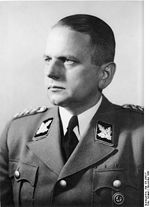
- SS-Gruppenführer Otto OhlendorfOtto OhlendorfOtto Ohlendorf was a German SS-Gruppenführer and head of the Inland-SD , a section of the SD. Ohlendorf was the commanding officer of Einsatzgruppe D, which conducted mass murder in Moldova, south Ukraine, the Crimea, and, during 1942, the north Caucasus...
- SS-Gruppenführer und Generalleutnant der Waffen-SS und Polizei Walter SchimanaWalter SchimanaWalter Schimana was a German Nazi Party and SS member, who rose to General rank during World War II, and was HSSPF in occupied Greece from October 1943.- Early life :Schimana was born in Troppau, then part of Austria-Hungary, the son of a newspaper editor...
German Commanders linked with Russian units
- SS-Brigadeführer Christoph Diehm
- SS-Obersturmbannführer Hans SieglingSchutzmannschaft-Brigade SieglingSchutzmannschaft-Brigade Siegling - was a Nazi German auxiliary police brigade formed by 31 July 1944 at East Prussia from the retreated from Belarus dozen remnants of the SiPo, SD, Ordnungsdienst units, Kommandanturas personnel and BKA units composed from the Ukrainians, Belarusians,...
- SS-Hauptsturmführer Albert Löffler
- SS-Sturmbannführer Franz Henningfeld
- SS-Brigadeführer Peter Hansen
- SS-Standartenführer Gustav LombardGustav LombardGustav Lombard was an SS Brigadeführer who served in World War II. During World War II, Lombard commanded the 8. SS-Division Florian Geyer, 23. SS-Mountain Division Kama and the 31. SS-Volunteer Grenadier Division...
- SS-Oberführer Constantin Heldmann
European front
- Major Ivan K. Voskoboynikov
- Waffen-Brigadefuhrer der SS Bronislav Vladislavovich KaminskiBronislaw KaminskiBronislav Vladislavovich Kaminski was the commander of the S.S. Sturmbrigade R.O.N.A. , an anti-partisan formation made up of people from the so-called Lokot Autonomy territory in the Nazi Germany occupied areas of Russia, which was later...
- General Andrei Andreivich VlasovAndrey VlasovAndrey Andreyevich Vlasov or Wlassow was a Russian Red Army general who collaborated with Nazi Germany during World War II.-Early career:...
- General Grigorii Meandrov
- Generalmajor Sergei Kuzmich BunyachenkoSergei BunyachenkoSergei Kuzmich Bunyachenko , October 5, 1902 near Kursk – August 2, 1946 in Moscow) was a Soviet Red Army defector to the German side during World War II and a Major General in the anti-communist Russian Liberation Army movement...
- Generalmajor Georgi A. Zverev
- Sonderführer K-officer (later Major-General of Wehrmacht) Boris SmyslovskyBoris SmyslovskyBoris Alexeyevich Smyslovsky was a Russian general, émigré, and anti-communist. His pseudonyms were Artur Holmston and von Regenau...
, a.k.a. Artur Holmston - General M.F. Skorodumov
- General Boris A. Shteyfon
- General Anatoliy I. Rogozhin
Russian political leaders
- Georg Liebbrandt
- Otto BrautigamOtto BräutigamOtto Bräutigam was a German diplomat and lawyer, who worked for the Auswärtiges Amt as well as the Reich Ministry for the Occupied Eastern Territories of Alfred Rosenberg in Nazi Germany. In this position Bräutigam was involved in the holocaust...
- Ivan K. Voskoboinikov
- Bronislaw KaminskiBronislaw KaminskiBronislav Vladislavovich Kaminski was the commander of the S.S. Sturmbrigade R.O.N.A. , an anti-partisan formation made up of people from the so-called Lokot Autonomy territory in the Nazi Germany occupied areas of Russia, which was later...
- Andrey VlasovAndrey VlasovAndrey Andreyevich Vlasov or Wlassow was a Russian Red Army general who collaborated with Nazi Germany during World War II.-Early career:...
- Konstantin RodzaevskyKonstantin RodzaevskyKonstantin Vladimirovich Rodzaevsky was the leader of the Russian Fascist Party, which he led in exile from Manchuria, chief editor of the RFP "Nash Put".-Far Eastern Fascism:...
- General Kislistin
Executor units
- Schutzmannschaft-Brigade SieglingSchutzmannschaft-Brigade SieglingSchutzmannschaft-Brigade Siegling - was a Nazi German auxiliary police brigade formed by 31 July 1944 at East Prussia from the retreated from Belarus dozen remnants of the SiPo, SD, Ordnungsdienst units, Kommandanturas personnel and BKA units composed from the Ukrainians, Belarusians,...
- EinsatzgruppenEinsatzgruppenEinsatzgruppen were SS paramilitary death squads that were responsible for mass killings, typically by shooting, of Jews in particular, but also significant numbers of other population groups and political categories...
(EinsatzkommandoEinsatzkommandoDuring World War II, the Nazi German Einsatzkommandos were a sub-group of five Einsatzgruppen mobile killing squads—up to 3,000 men each—usually composed of 500-1,000 functionaries of the SS and Gestapo, whose mission was to kill Jews, Romani, communists and the NKVD collaborators in the captured...
)
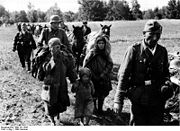
- 14th Waffen Grenadier Division of the SS Galicia (1st Ukrainian)
- Georgian Legion (1941–1945)
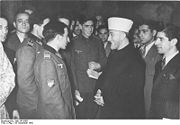
- Azeri Waffen SS Volunteer FormationsAzeri Waffen SS Volunteer FormationsAzeri SS Volunteer Formations were volunteers prisoners of war from the USSR, and from the countries annexed by Russia after 1939. They were organized to fight against the Soviets on the German side.-Origins:...
Russian volunteers in German Army forces
- HilfswilligeHiwi (volunteer)Hiwi is a German abbreviation. It has two meanings, "voluntary assistant" and "assistant scientist" .- :...
or Hiwi Russians - OstlegionenOstlegionenOstlegionen or Osttruppen were conscripts and volunteers from the occupied eastern territories recruited into the German Army of the Third Reich during the Second World War....
(Russian sections) - 29th Waffen Grenadier Division of the SS RONA (1st Russian)
- 29th Waffen Grenadier Division of the SS (1st Italian)29th Waffen Grenadier Division of the SS (1st Italian)The 29th Waffen Grenadier Division of the SS or Legione SS Italiana was created on 10 February 1945 as the second SS-Division numbered 29. The first on the 29th Waffen Grenadier Division of the SS , was disbanded. The new unit created in November 1943, was based on the Waffen-Grenadier-Brigade...
(Russian volunteers unit) - 30th Waffen Grenadier Division of the SS (2nd Russian)30th Waffen Grenadier Division of the SS (2nd Russian)The 30th SS Grenadier Division was a German Waffen SS infantry division formed largely from Belarussian, Russian and Ukrainian personnel of the Schutzmannschaft-Brigade Siegling in August 1944 at Warsaw, Poland. The division was moved by rail to southeastern France by mid-August 1944 to combat the...
- 29th Waffen Grenadier Division of the SS RONA (1st Russian)
- Russkaia Osvoboditelnaya Armiya (ROA)Russian Liberation ArmyRussian Liberation Army was a group of predominantly Russian forces subordinated to the Nazi German high command during World War II....
- Guard Corps Brigade of ROA
- "Schutzmannschaft-Brigade SieglingSchutzmannschaft-Brigade SieglingSchutzmannschaft-Brigade Siegling - was a Nazi German auxiliary police brigade formed by 31 July 1944 at East Prussia from the retreated from Belarus dozen remnants of the SiPo, SD, Ordnungsdienst units, Kommandanturas personnel and BKA units composed from the Ukrainians, Belarusians,...
" or "SS-Polizei-Bataillon-Siegling" - 2nd KNOR Division (600. (Russische) Infanterie-Division)
- 1st KNOR Division (650. (Russische) Infanterie-Division)
- 3rd KNOR Division (in development still at the end of the war)
- Freiwilligen-Stamm-Regiment 3 (Russians & Ukrainians)
- Freiwilligen-Stamm-Regiment 4 (Russians & Ukrainians)
- Freiwillige SS reg. Warager (Wrangel SS Regiment)
- 1st Russian National Army (1st RNA, also known as Boyarski Brigade)
- Sonderheadquarters R (special headquarters Russia)
- Special division R (12 training reconnaissance battalions)
- 1064th Russian Grenadier Regiment of 599th Russian Brigade
- 1st Russian National SS brigade Drushina
- Russkiy Okhranniy KorpusRussian CorpsThe Russian Corps was an armed force composed of anti-communist Russian emigres that existed during the Second World War in German-occupied Serbia...
- Otdel'niy Russkiy Korpus
- Russisches SchutzkorpsRussian CorpsThe Russian Corps was an armed force composed of anti-communist Russian emigres that existed during the Second World War in German-occupied Serbia...
or Russisches Schutzkorps Serbien (Russian Units in Balkans area) - Russian fighter volunteers on Fehrbelliner Platz (Berlin U-Bahn)Fehrbelliner Platz (Berlin U-Bahn)Fehrbelliner Platz is a station of the Berlin U-Bahn located in the Wilmersdorf district on the and the .The U3 section was opened on October 12, 1913 as one of the line's original stations, the U7 section on January 29, 1971 with the line's extension from Möckernbrücke...
European front
- Narodnaya Socialisticheskaya Partiya (Russian National Socialist PartyRussian National Socialist PartyThe Russian National Socialist Party is a neo-Nazi party based in Russia. The group achieved international notoriety in 2007 when a video appeared on the internet purportedly showing members decapitating two immigrants.-Development:The party grew out of the followers of Konstantin Kasimovsky, a...
), later renamed Nacional-Socialisticheskaya Rabochaya Partiya Rossiya (National-Socialist Labour Party of Russia) with first led by Ivan K. Voskoboinikov, later for Bronislav Kaminski in the Lokot RepublicLokot RepublicThe Lokot Autonomy was a semi-autonomous region in Nazi German-occupied Central Russia led by Bronislav Kaminski's administration from July 1942 to August 1943. The name is derived from the region's administrative center, the urban-type settlement of Lokot in Oryol Oblast...
Pacific front
- Russian Fascist PartyRussian Fascist PartyThe Russian Fascist Party , sometimes called the All-Russian Fascist Party, was a minor Russian emigre movement that was based in Manchukuo during the 1930s and 1940s....
, led by Konstantin RodzaevskyKonstantin RodzaevskyKonstantin Vladimirovich Rodzaevsky was the leader of the Russian Fascist Party, which he led in exile from Manchuria, chief editor of the RFP "Nash Put".-Far Eastern Fascism:...
in exile from ManchukuoManchukuoManchukuo or Manshū-koku was a puppet state in Manchuria and eastern Inner Mongolia, governed under a form of constitutional monarchy. The region was the historical homeland of the Manchus, who founded the Qing Empire in China...
(Japanese satellite Chinese 'empire' in Manchuria). - Monarchist Party, led by General Kislistin, in Manchukuo.
European front
- NSPNSPNSP is a three-letter abbreviation with multiple meanings, including:* Afghan National Solidarity Programme* Nankoku Shōnen Papuwa-kun, a Super Famicom game* National Ski Patrol* Netaji Subhash Place...
or NSRPR Party - Russian National Committee (Narodnaya Rossiya Komite)
- Committee for the Liberation of the Peoples of RussiaCommittee for the Liberation of the Peoples of RussiaThe Committee for the Liberation of the Peoples of Russia was a committee composed of military and civilian anticommunists from territories of the Soviet Union...
(Komite Osvobozhyeniya Narodov Rossi) (KNOR), movements led by General Andrey VlasovAndrey VlasovAndrey Andreyevich Vlasov or Wlassow was a Russian Red Army general who collaborated with Nazi Germany during World War II.-Early career:... - Committee for the Liberation of the Peoples of RussiaCommittee for the Liberation of the Peoples of RussiaThe Committee for the Liberation of the Peoples of Russia was a committee composed of military and civilian anticommunists from territories of the Soviet Union...
- Smolensk Manifesto
- Prague ManifestoPrague ManifestoThe Prague Manifesto is a document that was created by several members of the Committee for the Liberation of the Peoples of Russia, an anti-communist coalition of former Soviet military and citizens who aimed to overthrow Soviet dictator Joseph Stalin and establish a non-communist government in...
also Hdraschin Manifesto - Russian Propaganda Schools
See also
- The Holocaust in the USSRThe Holocaust in the USSRHolocaust in the USSR refers to the genocide of Jews during the occupation of the USSR by Nazi Germany.- On the eve of the Holocaust :Beyond longstanding controversies, ranging from the Molotov-Ribbentrop Pact to anti-Zionism, the Soviet Union did grant official "equality of all citizens regardless...
- International Conference to Review the Global Vision of the HolocaustInternational Conference to Review the Global Vision of the HolocaustThe International Conference to Review the Global Vision of the Holocaust was a two-day conference that opened on December 11, 2006, in Tehran, Iran. Iranian Foreign Minister Manouchehr Mottaki said the conference sought "neither to deny nor prove the Holocaust.....
- List of murders of children by Nazis
- Lokot Autonomy
- Russian Research and Educational Holocaust CenterRussian Research and Educational Holocaust CenterThe Russian Research and Educational Holocaust Center was founded in 1992 in Moscow and has since then been working on awareness raising of the Holocaust in the Russian society...

